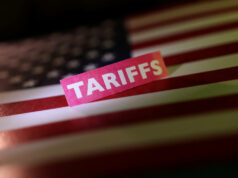Duterte: ‘Our duty’ with China to use ‘our seas’
By Arjay L. Balinbin
Reporter
PRESIDENT Rodrigo R. Duterte returned to the Philippines on Sunday after a “highly successful” official visit to China for the Second Belt and Road Forum, Malacañang said.
Mr. Duterte also said at Session III of the Leaders’ Roundtable Sessions at the Yanqi Lake International Conference Center, “As channels of transportation and communication, and a vital source of sustenance and livelihood, our oceans and seas connect and sustain us. It is thus our collective duty to promote their sustainable and peaceful use in accordance with international law.”
National Security Adviser Hermogenes C. Esperon, Jr. said last Wednesday that the government is looking into the possibility of declaring Pag-asa Island and Eastern Kalayaan in the West Philippine Sea as marine protected areas. He made this statement after the reported harvesting of giant clams by Chinese vessels off Panatag Shoal.
In his statement, Presidential Spokesperson Salvador S. Panelo said, “The Palace is pleased to announce that President Rodrigo Roa Duterte had a highly successful official visit to China.”
In his last day in Beijing, the President said the Philippines, along with the rest of Asia, is on the path of “economic resurgence.”
“By 2020, the combined economies of Asian countries will be larger than that of the rest of the world. The Philippines in particular is set to join the ranks of upper middle-income countries as it is projected to become the 25th largest economy in the world in PPP (public private partnership) terms,” Mr. Duterte said at the same forum.
Sought for comment, Ateneo Policy Center senior research fellow Michael Henry Ll. Yusingco said that despite the agreed cooperation between Manila and Beijing under the Belt and Road Initiative, the Philippine government can always “issue policies and/or employ regulatory measures covering any parts of its national territory.”
“This power cannot be limited by any contract entered into by the government of the day, i.e. the memorandum of understanding (MoU) with China,” he said via e-mail on Sunday.
“So when the administration refuses to act on the invasion of China over these disputed areas, that is an example of self-imposed limitation on its part. But when it acts to prevent or repulse any acts of invasion, then that is just an exercise of a sovereign duty, justified by the 1987 Constitution and sanctioned by international law. No foreign government, such as China, can ever claim that protecting the national territory cannot be done by a free and independent nation-state,” Mr. Yusingco said.
He noted as well that the controversy in the West Philippine Sea is “very complex” and that it “cannot be addressed by reference to the arbitral ruling alone.”
“This must be accompanied by bilateral talks with China, being the main aggressor; multilateral discussions with other interested nations such as the United States, Australia, South Korea and Japan; and most critically, consensus building with ASEAN (Association of Southeast Asian Nations). Any move short of this will most likely not resolve the controversy in the WPS. Sadly, it is not clear, at least not to me, if the government is employing this three-pronged diplomatic effort,” he added.
Mr. Duterte witnessed last Friday the signing of 19 business agreements on energy, infrastructure, food, telecommunications, sale of agricultural products, tourism, and economic zone and industrial park development. The Palace said the estimated investment value of these agreements is $12.165 billion.
Presidential Anti-Corruption Commission (PACC) Commissioner and Spokesperson Greco Antonious Beda B. Belgica, when sought for comment, told BusinessWorld in a phone message on Sunday that his agency has “signed” a memorandum of understanding (MoU) on “anti-corruption drive” with its Chinese counterpart in Beijing.
The President, according to the Palace, also met separately with fellow ASEAN Leaders Prime Minister Mahathir Mohamad of Malaysia, Prime Minister Prayut Chan-o-Cha of Thailand, State Counsellor Aung San Suu Kyi of Myanmar, Prime Minister Hun Sen of Cambodia, and Prime Minister Nguyen Xuan Phoc of Vietnam. He also met President Khaltmaa Battulga of Mongolia and International Monetary Fund Managing Director Christine Lagarde.
The President assured prospective foreign investors that his government will “create an enabling environment that they will find comfortable.”
“And that is the reason why I am asking everybody for his utmost cooperation. I guarantee you that there will be no hassles, no asking for money, no nothing. And if you think that the permit or the concession privilege about to be given is unduly delayed, please let me know,” he said.
Also sought for comment, University of Santo Tomas political science professor Marlon M. Villarin said in a phone message: “The 19 signed agreements from the Belt and Road Forum are economically significant but at the same time politically and socially challenging.”
“Economically, the agreements open opportunity for development projects in our country; politically, these are clouded with so much doubts as to the faithfulness of the Chinese government in our diplomatic ties with them; and socially, there is a growing concern as to what safety net our government has in protecting our national patrimony,” he said further.



